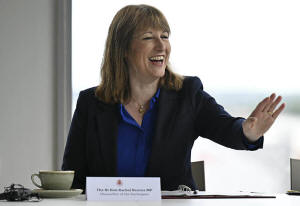UK Treasury chief will slash financial services red tape to boost
investment
[July 16, 2025] By
JILL LAWLESS
LONDON (AP) — U.K. Treasury chief Rachel Reeves said Tuesday that she’ll
cut red tape for banks and finance firms so that “informed risk-taking”
can help kickstart Britain’s sluggish economy.
The government is trying to regain the economic initiative after rocky
weeks of costly U-turns and figures showing the U.K. economy contracted
for two months running.
Arguing that regulation often “acts as a boot on the neck of
businesses,” Reeves announced plans to pare back some of the rules
introduced after the 2008 global financial crisis, which was triggered
by risky lending. That includes reforms to “ring-fencing” rules enacted
to separate banks’ retail and investment banking activities, and a
review of the amount of capital banks must hold.
She said that it was the widest set of reforms of financial services in
more than a decade.
“We are fundamentally reforming the regulatory system, freeing up firms
to take risks and to drive growth,” Reeves said on a visit to Leeds in
northern England.
Reeves set out the changes in her annual Mansion House speech to finance
bigwigs in London, saying she was “rolling back regulation that has gone
too far in seeking to eliminate risk."

“I have placed financial services at the heart of the government’s
growth mission ... with a ripple effect that will drive investment in
all sectors of our economy and put pounds in the pockets of working
people,” she said.
Reeves also praised new Bank of England guidance allowing mortgage
lenders to loan more than 4½ times a buyer’s income, saying that would
allow tens of thousands of people to buy their first home.
She added that “regulators in other sectors must take up the call I make
this evening not to bend to the temptation of excessive caution, but to
boldly regulate for growth.”
[to top of second column] |

British Chancellor of the Exchequer Rachel Reeves gestures during a
roundtable discussion with top finance executives at the Lloyds
Banking Group's offices, as she announces a package of financial
services reforms, in Leeds, England, Tuesday July 15, 2025. (Oli
Scarff/PA via AP)
 The center-left Labour Party won a
landslide election victory in July 2024, but has struggled to
deliver on its pledge to boost economic growth.
Efforts to soothe markets and demonstrate fiscal
prudence have proved unpopular with voters. A decision to end winter
home heating subsidies for millions of retirees, announced soon
after the election, was reversed last month. Earlier this month, the
government ditched planned cuts to welfare spending after an outcry
from Labour lawmakers.
The U-turns have reduced the Treasury's future income by several
billion pounds, increasing the likelihood of tax increases in the
fall. But the government has boxed itself in by ruling out hikes to
sales tax or to income tax for employees.
Questions swirled about Reeves’ future earlier this month when she
appeared in tears in the House of Commons during the weekly prime
minister’s questions session. The Treasury said that Reeves was
dealing with a “personal matter.”
The cost of government borrowing spiked at the sight of Reeves’
tears, but settled down after Prime Minister Keir Starmer gave her
his full backing.
All contents © copyright 2025 Associated Press. All rights reserved |